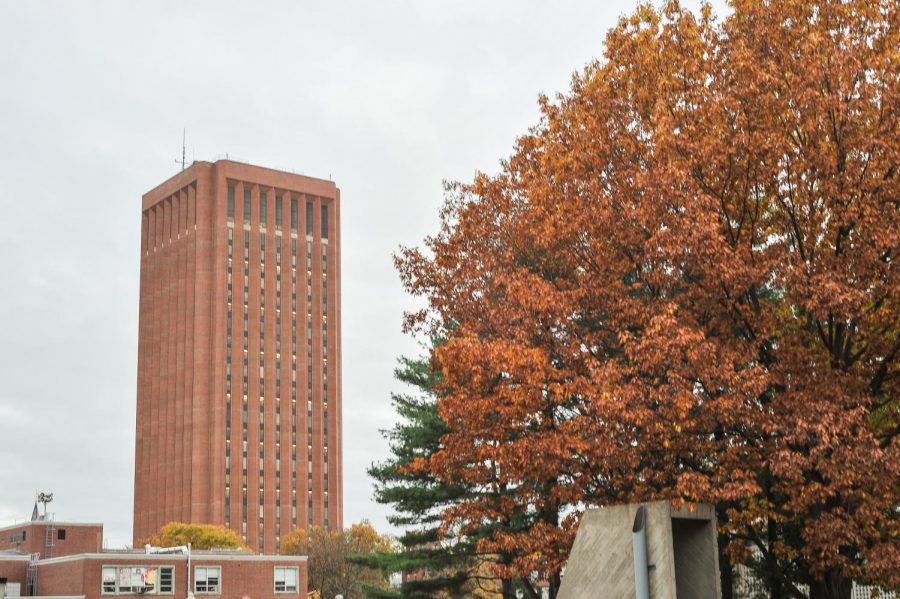Kept inside by the cold rain on Monday afternoon, a new anti-racism coalition at the University of Massachusetts refused to be kept quiet about campus safety.
About 20 undergraduate and graduate students stood in the lobby of South College, offering coffee and cookies, interest forms and information to those passing by. Tyler Smart, an English doctoral student, called the coffee cart the first event of an “emergent anti-racist coalition.” While there are several organizations on campus working to address racism and discrimination, Smart said they wanted to reach out and combine these efforts.
While organizers initially considered holding a rally on Monday afternoon, they decided that it would be more productive to focus on starting conversations to bring greater awareness to these issues.
“There’s nothing wrong with talking,” Smart said. “There’s no reason to feel isolated.”
Attendees started conversation with a list of talking points focused on a campus climate survey, administrative inaction and the Campus Five Year Plan. In the campus climate survey in 2017, 51 percent of African-American, Latino, Asian and Native American students reported dissatisfaction with the racial climate at the University. Of the ALANA students, 46 percent reported experiencing unfair treatment based on their race or identity in the same survey.
Smart cited almost 20 racial incidents which took place in the 2018-19 academic year, including the alleged racial profiling of a Whitmore Administration Building employee, and the failure of the University to respond to demands from the March against White Supremacy last fall.
“[The University is] not responding to students who are experiencing racial discrimination, sexual discrimination, just [any] discrimination,” Smart said. According to Smart, a University tactic after incidents of hate occur is “to separate and isolate.”
“We’re the ones that are paying to be here. We’re the ones who are living through it.”
The talking points at the event pointed out that the campus strategic plan focuses on branding like “Hate Has No Home At UMass” and “Dignity and Respect,” but the “University fails to take adequate measures in responding to the hatred and racism that occurs on campus.”
Mary Dickman, the mobilization coordinator of the Graduate Employee Organization and a Ph.D. candidate in the communication department said, “It’s been a year and we haven’t seen any substantial movement on the part of the University.”
While the event was not sponsored by GEO, several members attended. Dickman said that she looks forward to working with GEO and other campus organizations, including the Residential Assistant/Peer Mentor Union, to address racism on campus in the future.
“There’s a lot of people very interested in making a change,” Dickman continued.
By holding the event shortly before winter break, Dickman and other organizers hope that UMass students will return in the spring semester with these issues on their mind.
According to Dickman, it is a tactic of the University to just “wait out” protests against inaction. Anna Ben-Hur, an undergraduate student in the social thought and political economy major, said a concern of inaction was the reason she chose to participate in the event. “I care about [people] at UMass feeling safe,” Ben-Hur said. “Students are feeling a lot of inaction from UMass.”
When asked how the coalition planned to move forward, Dickman envisioned events aimed at awareness, facilitating conversations between activists and encouraging the campus community to talk about how to make all community members feel safe.
Originally from Florida, Dickman remembered seeing seeing Neo-Nazis, the Confederate flag and Ku Klux Klan flyers. After coming to New England, Dickman noted that, although racism is stereotypically associated with the south, people in the north are less likely to identify and confront racism.
Liam Templeman, an undergraduate student in geography, said that racism “can start at a smaller scale,” like the incidents at UMass. Templeman, who transferred to the University at the start of the fall 2019 semester, said he hadn’t heard of the racial incidents from the previous academic year before he came to campus and found that “concerning.”
“It [racism] does grow if it isn’t confronted immediately and thoroughly,” Templeman added.
When asked for comment, Ed Blaguszewski, a campus spokesman, said that, in collaboration with many campus leaders, the University’s Office of Equity and Inclusion “is continuing the vital work of cultivating a culture of inclusiveness while we also celebrate the vast diversity of our community.”
Blaguszewski also highlighted events held by the Office of Equity and Inclusion in the fall 2019 semester, including a campus symposium on polarization. In September, Nefertiti Walker, interim associate chancellor for diversity, stated that “the future of society and work” depends on institutions such as UMass proving opportunities to develop leaders “who understand the value of diversity and can promote equity and inclusion.”
Dickman mentioned concerns over students who were willing to identify with extremist and nationalist organizations, asking what it meant that those students “feel comfortable” identifying as such at the University.
“This isn’t an issue of free speech, it’s about campus safety,” Dickman said.
Kathrine Esten can be reached at [email protected] and followed on Twitter at @KathrineEsten.



















